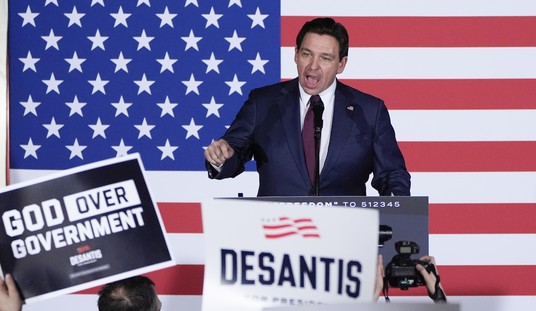Old and busted: Barack Obama is the most gifted orator in American politics since … well, FDR, Lincoln, William Jennings Bryan, take your pick. New hotness: The President can’t express himself clearly without his apologists at the ready to explain his “context.” For the third time in two months, Obama’s musings on the economy have put him in hot water and given Mitt Romney huge openings to exploit. Kim Strassel believes that four words in particular have Team Obama in a panic:
What’s the difference between a calm and cool Barack Obama, and a rattled and worried Barack Obama? Four words, it turns out.
“You didn’t build that” is swelling to such heights that it has the president somewhere unprecedented: on defense. Mr. Obama has felt compelled—for the first time in this campaign—to cut an ad in which he directly responds to the criticisms of his now-infamous speech, complaining his opponents took his words “out of context.” …
Ms. Warren’s argument—that government is the real source of all business success—went viral and made a profound impression among the liberal elite, who have been pushing for its wider adoption. Mr. Obama chose to road-test it on the national stage, presumably thinking it would underline his argument for why the wealthy should pay more. It was a big political misstep, and now has the Obama team seriously worried.
And no wonder. The immediate effect was to suck away the president’s momentum. Mr. Obama has little positive to brag about, and his campaign hinges on keeping negative attention on his opponent. For months, the president’s team hammered on Mr. Romney’s time at Bain, his Massachusetts tenure, his tax returns. “You didn’t build that” shifted the focus to the president, and his decision to respond to the criticisms has only legitimized them and guaranteed they continue.
The Obama campaign’s bigger problem, both sides are now realizing, is that his words go beyond politics and are more devastating than the Romney complaints that Mr. Obama is too big-government oriented or has mishandled the economy. They raise the far more potent issue of national identity and feed the suspicion that Mr. Obama is actively hostile to American ideals and aspirations. Republicans are doing their own voter surveys, and they note that Mr. Obama’s problem is that his words cause an emotional response, and that they disturb voters in nearly every demographic.
The problem for Obama didn’t start with those four words, however. They started in June, after a poor jobs report and the affirmation that the first quarter showed significant decline in the US economy and the second quarter was headed in the same direction, which was confirmed today. Obama insisted that “the private sector is doing fine” and pushed for more government jobs. Both of those assertions caused widespread scorn and created the appearance that Obama was oddly disconnected from economic reality. That played directly into Obama’s Warren declaration earlier this month, amplifying and corroborating that sense of disconnect.
It doesn’t stop there, either. Last week, Obama spoke two words to an Oakland, California audience that may arguably haunt him even more — “it worked”:
I’m running because I believe you can’t reduce the deficit — which is a serious problem, we’ve got to deal with it — but we can’t reduce it without asking folks like me who have been incredibly blessed to give up the tax cuts that we’ve been getting for a decade. (Applause.) I’ll cut out government spending that’s not working, that we can’t afford, but I’m also going to ask anybody making over $250,000 a year to go back to the tax rates they were paying under Bill Clinton, back when our economy created 23 million new jobs — (applause) — the biggest budget surplus in history and everybody did well.
Just like we’ve tried their plan, we tried our plan — and it worked. That’s the difference. (Applause.) That’s the choice in this election. That’s why I’m running for a second term.
Obama apologists are screeching once again that his critics are taking him out of context. Obama was referring to the Clinton tax-hike plan, they insist, which worked. There are a number of problems with this, not the least of which is that the Clinton tax hikes took place in 1993, well after the recovery from the 1990-1 recession began, and the real boom took place after 1997, when tax cuts got put in place. But there is a more fundamental problem with this argument: Obama put into place his own plan, not Clinton’s, in 2009 — a massive stimulus bill that cost $838 billion and flopped at its expressed goals, keeping unemployment below 8% and stimulating better-than-usual recovery growth. During Obama’s first two years in office, he had plenty of time to push Clinton’s policies through a Congress with large majorities in both chambers had he wanted to do so. Finally, Obama wasn’t even in politics in 1993 when Clinton passed his tax hikes, so he can hardly call it “our plan.”
If one accepts the “context” of Obama’s apologists on this point, then one would have to conclude that Obama himself considers his own plan a failure, and that we need to revert back to the 1993 plan in which Obama had no part at all. That’s not the case, as Obama has talked about another round of stimulus spending, making it clear that it is his own plan to which he referred in Oakland, as he needs a second term to pursue it. And it’s equally clear from the results that Obama’s plan hasn’t worked at all.
Investors Business Daily’s double Pulitzer-winning editorial cartoonist Michael Ramirez has a sharp riposte to those who insist that quoting Obama accurately is somehow unfair:
Indeed. I believe, as does Guy Benson, that it’s these two words that will be the most damaging for Obama in this election … at least so far.
Also, be sure to check out Ramirez’ terrific collection of his works: Everyone Has the Right to My Opinion, which covers the entire breadth of Ramirez’ career, and it gives fascinating look at political history. Read my review here, and watch my interviews with Ramirez here and here. And don’t forget to check out the entire Investors.com site, which has now incorporated all of the former IBD Editorials, while individual investors still exist.
And a heads-up — Ramirez will have a new book out soon. We’ll have more on that later this summer.









Join the conversation as a VIP Member